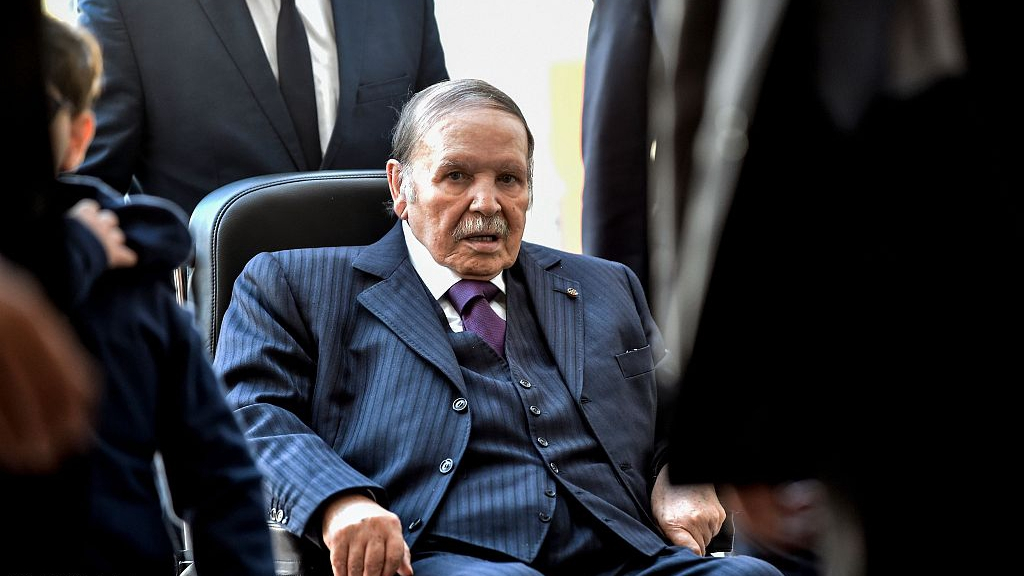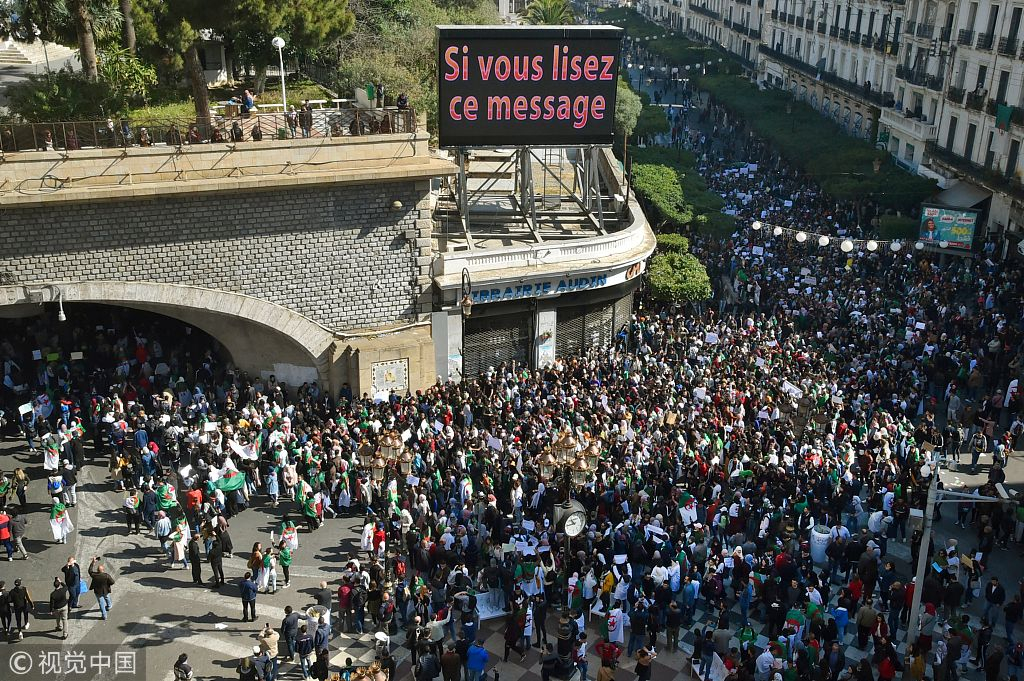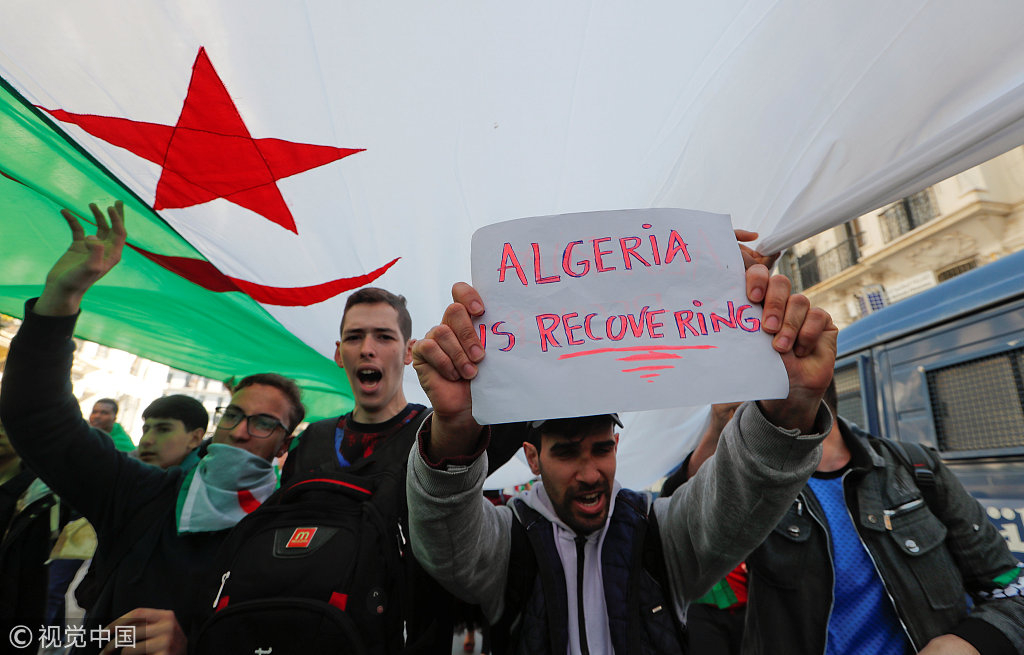
Africa
11:37, 13-Mar-2019
Massive protests in Algeria call for new government
CGTN

Thousands demonstrated in Algeria on Tuesday, demanding immediate political changes a day after President Abdelaziz Bouteflika abandoned his bid for a fifth term in power but stopped short of stepping down.
Huge crowds gathered in several cities and Ennahar TV reported workers began a strike that paralyzed operations at the Mediterranean port at Bejaia. But in the capital, aside from a few hundred protesters, life carried on normally.
Bouteflika, 82, promised on Monday a transition to a new leadership. But he postponed an election set for April, meaning he will likely remain in power for some time.
Veteran diplomat Lakhdar Brahimi and protest groups are expected to join a conference planning Algeria's future that Bouteflika said should try to finish its work by the end of 2019, government and political sources told Reuters.

Algerian students demonstrate in the center of the capital Algiers after President Abdelaziz Bouteflika postponed an April 18 election, March 12, 2019. / VCG Photo
Algerian students demonstrate in the center of the capital Algiers after President Abdelaziz Bouteflika postponed an April 18 election, March 12, 2019. / VCG Photo
Brahimi, a former Algerian foreign minister and UN special envoy who is in his 80s, is expected to chair the conference that will oversee the transition, draft a new constitution and set the date for elections, a government source said.
While Brahimi is widely respected, he and other people of his generation may not fit the profile of figures who can deliver an energetic Algeria full of fresh ideas.
Crowds who came back onto the streets on Tuesday demanded quicker action, reflecting suspicions that the old guard, adept at manipulating opposition groups, might be seeking to weaken and divide the protest movement.
"The whole system must disappear immediately. Our battle will continue," 25-year-old student Noureddine Habi said in central Algiers as others chanted: "We want this system to go."
High unemployment
Algerians have become disenchanted with Bouteflika and other veterans of the 1954-62 war of independence against France who have dominated a country with high unemployment, poor services and rampant corruption despite its oil and gas.
"The government has often encouraged the radicalization of popular protests in the past as a ploy to divide and rule, and it knows all the moves," wrote North Africa expert Hugh Roberts.

People take part in a protest demanding immediate political change in Algiers, Algeria March 12, 2019. / VCG Photo
People take part in a protest demanding immediate political change in Algiers, Algeria March 12, 2019. / VCG Photo
More than a quarter of Algerians under 30 are unemployed.
"We do not need Bouteflika to decide on behalf of the people," said Ahmed Beddine, a 50-year-old grocer.
Algeria's deputy prime minister said Bouteflika's decision was the most important turning point since independence from France, Annahar TV reported.
"A competent government will be established, with the confidence of the participants in the national conference, which will supervise the presidential process," said Ramtan Lamamra.
Contacts are now underway with war veterans who may take part in the transition, including Djamila Bouhired and Zohra Drif Bitat, two of the most famous guerrilla fighters of the conflict, political sources said.
Seen by Algerians as revolutionary heroines, they were part a network of women who carried explosives in a bombing campaign in 1956 that included an attack on the fashionable Milk Bar cafe depicted in the film The Battle of Algiers.
Their revolutionary credentials may not be enough to impress restless young Algerians, who are desperate for opportunities and criticize their elderly leaders for dwelling on the past.
French President Emmanuel Macron said Bouteflika's statement opened a new chapter and called for a "reasonable duration" to the transition period.
"I think it's a sign of maturity. We will do everything to accompany Algeria in this transition with friendship and respect."
The United States said it backed the talks going on in Algeria and that it was "closely monitoring" reports elections had been postponed.
"We support efforts in Algeria to chart a new path forward based on dialogue that reflects the will of all Algerians and their aspirations for a peaceful and prosperous future," State Department spokesman Robert Palladino told a briefing.
Source(s): Reuters

SITEMAP
Copyright © 2018 CGTN. Beijing ICP prepared NO.16065310-3
Copyright © 2018 CGTN. Beijing ICP prepared NO.16065310-3